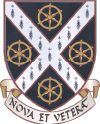Catz student wins Gold at iGEM competition
Congratulations to second-year student Laurel Constanti Crosby (2017, Biological Sciences), who was part of the undergraduate Oxford iGEM team that won a gold medal, as well as the ‘Best Therapeutics Project’ award and three other nominations, at the 2018 iGEM competition.
The iGEM competition is an annual interdisciplinary contest held in Boston, USA, that challenges students to spend the summer working on applying synthetic biology to address real world issues, before they present their work at a five-day conference later in the year. This year’s competition had more than 300 teams from over 40 different countries.
Laurel joined nine other first- and second-year Oxford students working on miBiome, a project to develop a novel treatment for inflammatory bowel disease (IBD). Their project, which involved developing a genetically engineered probiotic, won the award for ‘Best Therapeutics Project’ as well as a gold medal. Combined with three additional nominations, the team succeeded in picking up as many awards and nominations as all the 13 other UK teams put together.
Reflecting on her experience competing in iGEM, Laurel said: ‘I was encouraged to take part in iGEM having heard about the success of previous Catz students. The experience of working on a self-directed project for over nine months, with other students from different scientific disciplines, was immensely rewarding. As well as being a rigorous scientific competition requiring a large amount of lab work and mathematical modelling, iGEM also places great value on public engagement; I had a great time teaching at Oxford summer schools, such as UNIQ, and talking to patients with IBD at the John Radcliffe hospital.’
This is the second year running that Catz has been represented in the victorious Oxford team, with students Alissa Hummer (2015, Biochemistry) and Zoe Catchpole (2015, Biochemistry) taking part in the 2017 iGEM competition. They too were hugely successful and brought home a gold medal as well as the ‘Best Diagnostics Project’ award, for their project developing a cheap and reliable diagnostic for Chagas’ disease.

